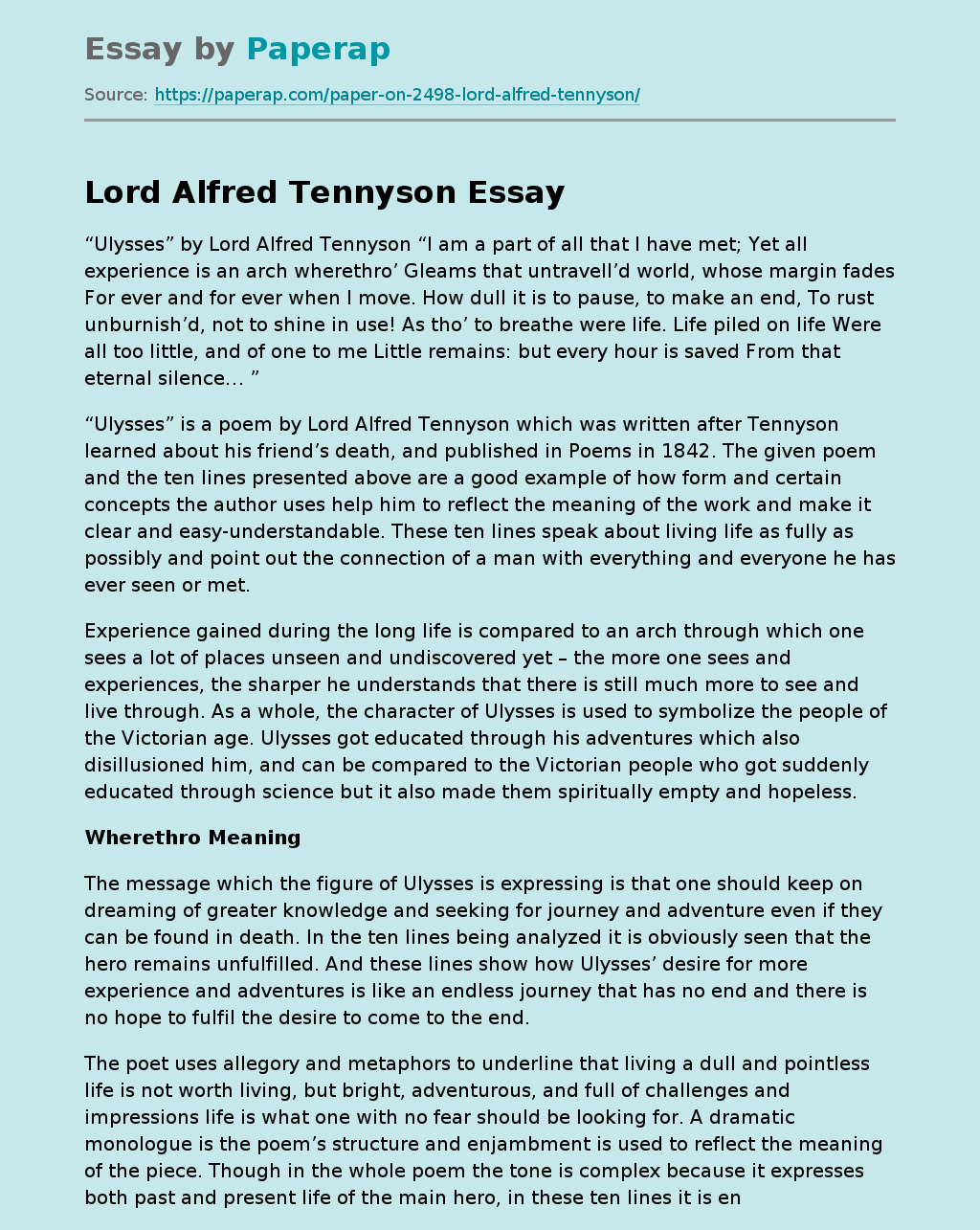Lord Alfred Tennyson
“Ulysses” by Lord Alfred Tennyson “I am a part of all that I have met; Yet all experience is an arch wherethro’ Gleams that untravell’d world, whose margin fades For ever and for ever when I move. How dull it is to pause, to make an end, To rust unburnish’d, not to shine in use! As tho’ to breathe were life. Life piled on life Were all too little, and of one to me Little remains: but every hour is saved From that eternal silence… ”
“Ulysses” is a poem by Lord Alfred Tennyson which was written after Tennyson learned about his friend’s death, and published in Poems in 1842.
The given poem and the ten lines presented above are a good example of how form and certain concepts the author uses help him to reflect the meaning of the work and make it clear and easy-understandable. These ten lines speak about living life as fully as possibly and point out the connection of a man with everything and everyone he has ever seen or met.
Experience gained during the long life is compared to an arch through which one sees a lot of places unseen and undiscovered yet – the more one sees and experiences, the sharper he understands that there is still much more to see and live through. As a whole, the character of Ulysses is used to symbolize the people of the Victorian age. Ulysses got educated through his adventures which also disillusioned him, and can be compared to the Victorian people who got suddenly educated through science but it also made them spiritually empty and hopeless.
Wherethro Meaning
The message which the figure of Ulysses is expressing is that one should keep on dreaming of greater knowledge and seeking for journey and adventure even if they can be found in death. In the ten lines being analyzed it is obviously seen that the hero remains unfulfilled. And these lines show how Ulysses’ desire for more experience and adventures is like an endless journey that has no end and there is no hope to fulfil the desire to come to the end.
The poet uses allegory and metaphors to underline that living a dull and pointless life is not worth living, but bright, adventurous, and full of challenges and impressions life is what one with no fear should be looking for. A dramatic monologue is the poem’s structure and enjambment is used to reflect the meaning of the piece. Though in the whole poem the tone is complex because it expresses both past and present life of the main hero, in these ten lines it is encouraging, edifying and, at the same time, confident and even insisting.
In this work Tennyson uses one of the most common metrical forms in English literature – iambic pentameter, i. e. an unstressed syllable is followed by a stressed one. Iambic pentameter is commonly used in blank verse as well as Tennyson uses it. Hence, the given lines have a regular meter but no rhyme, though they sound rather regular and musical. The blank verse being used is flexible, with both declamatory style and colloquial rhythms employed in it. The poet also uses a lot of active verbs and this concept directs the reader to accept and understand Ulysses’ reasoning and decision.
In general due to their mood and literary peculiarities have been mentioned the given lines create both hopeless and optimistic mood at the same time: they are inconsistent. Ulysses knows his journey will have no end, but still is sure that wrong and pointless would be to stop and stay. It is an allegory about mortality.
Bibliography
Thomson, Alastair. The Poetry of Tennyson. London and New York: Routledge and Kegan Paul, 1986. Mazzeno, Laurence W. “Alfred, Lord Tennyson”. Critical Survey of Poetry 7 (1992): 3333-3345
Lord Alfred Tennyson. (2019, Dec 05). Retrieved from https://paperap.com/paper-on-2498-lord-alfred-tennyson/

